國立臺灣師範大學 | |||||||||||||||
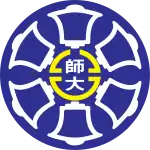 | |||||||||||||||
Former name | Taihoku College (1922) Taiwan Provincial College (1946) Taiwan Provincial Normal University (1955) | ||||||||||||||
|---|---|---|---|---|---|---|---|---|---|---|---|---|---|---|---|
| Motto | 誠正勤樸[1] | ||||||||||||||
Motto in English | Sincerity, Justice, Diligence, and Simplicity[2] | ||||||||||||||
| Type | Public (National) | ||||||||||||||
| Established | 1922 | ||||||||||||||
| President | Cheng-Chih Wu (吳正己) | ||||||||||||||
Academic staff | 1,541 | ||||||||||||||
| Students | 15,112[3] | ||||||||||||||
| Undergraduates | 8,394 | ||||||||||||||
| Postgraduates | 5,686 | ||||||||||||||
| Location | , | ||||||||||||||
| Campus | Urban: Main Campus & Gongguan Campus Rural: Linkou Campus | ||||||||||||||
| Colours | Blue and Red | ||||||||||||||
| Affiliations | NTU System UAAT ICUE AAPBS[4] AACSB UAiTED | ||||||||||||||
| Website | English, Chinese | ||||||||||||||
| Chinese name | |||||||||||||||
| Simplified Chinese | 国立台湾师范大学 | ||||||||||||||
| Traditional Chinese | 國立臺灣師範大學 | ||||||||||||||
| |||||||||||||||
National Taiwan Normal University (NTNU; Chinese: 國立臺灣師範大學; pinyin: Guólì Táiwān Shīfàn Dàxué)[5] is a public normal university in Taipei and New Taipei City, Taiwan.
NTNU is affiliated with National Taiwan University and National Taiwan University of Science and Technology as part of the National Taiwan University System.[6] NTNU is a member of University Academic Alliance in Taiwan,[7] International Consortium for Universities of Education in East Asia,[8] University Alliance in Talent Education Development,[9] and AAPBS.[10]
The university enrolls approximately 17,000 students each year. Approximately 1,600 students are international. 1,000 students are overseas Chinese in preparatory programs.[11]
In 2023, NTNU has been ranked 431th by QS World University Rankings, 501–600th by THE, and 1049th by US.News. NTNU has been ranked among the top 50 in the world in the four disciplines of education, linguistics, sports, and library and information management systems.[12][13]
The Research Center for Psychological and Educational Testing (RCPET) at NTNU is responsible for organizing Taiwan's annual Comprehensive Assessment Program for Junior High School Students (CAP).[14] NTNU is also the convening institution for the Committee of College Admission Practical Examination, which is responsible for conducting practical examinations in the fields of fine arts, music, and physical education for use in university admissions across Taiwan.[15] Mandarin Training Center (MTC) is the oldest and the largest Chinese language teaching institution in Taiwan.[16]The Test of Chinese as a Foreign Language (TOCFL) is administered by the Steering Committee for the Test Of Proficiency-Huayu (SC-TOP) at NTNU. [17]
History
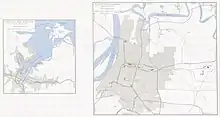

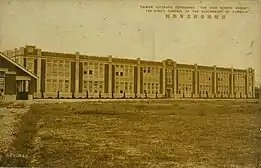
National Taiwan Normal University opened its doors in the early 20th century during Japanese rule in Taiwan. Taiwan's Japanese governors established the school as Taiwan Provincial College. Soon after they gave it the name Taihoku College (Taihoku is "Taipei" in Japanese). The school's purpose was to nurture a native educated class qualified to assist the government in matters of administration. Many buildings on the university's main campus date from the Japanese colonial period, including the Administration Building, the Lecture Hall, Wenhui Hall and Puzi Hall. Japanese architects incorporated features of the Neo-Classical, Gothic and Gothic Revival styles often encountered on European university campuses. A room in the Lecture Hall housed the traditional Japanese document that authorizes and formalizes campus construction.[18]
In the 1940s, the university, along with National Taiwan University, Taiwan Provincial College of Agriculture, and Taiwan Provincial College of Engineering, were the only four higher education institutions in Taiwan.
Some school publications still display 1946 as the institution's founding date in reference to this regime change. A number of Taiwan's leading authors, poets, artists, educators, painters, musicians, linguists, sinologists, philologists, philosophers, and researchers have passed through the university's doors as students and faculty. In 1956 the Mandarin Training Center opened its doors as an extension of the college. The school acquired its present name, National Taiwan Normal University, in 1967. By now the school had established itself as a recognized center of learning in arts, literature and the humanities; its fundamental mission, though, remained the preparation of teachers.
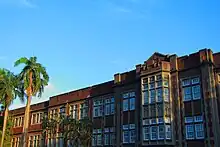
As Taiwanese society made its shift from authoritarian rule to democracy in the 1990s, the university saw its role transformed by passage of the 1994 Teacher Preparation Law. The law gave more schools responsibility for teacher training and set NTNU on its present course as a truly comprehensive university. New departments were created, course offerings and majors were expanded, and new faculty were hired. the merger of NTNU with the University Preparatory School for Overseas Chinese Students in 2006. The university became a hub of international activity, enabling Taiwanese students to travel abroad, attracting international students to Taipei, and building exchange programs with dozens of sister institutions around the world.[11]
Campus
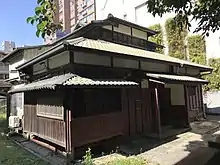
NTNU's main campus is located in the heart of Taipei, adjacent to the culturally rich and artistic atmosphere of the Yongkang Street Area, and within walking distance are famous attractions such as Daan Forest Park, Chiang Kai-shek Memorial Hall, Taipei Grand Mosque, Mongolian & Tibetan Cultural Center, etc. Universities affiliated with the NTU System, such as National Taiwan University and National Taiwan University of Science and Technology, are also nearby. The university also has campuses in the Wenshan District of Taipei (Gongguan Campus) and in the Linkou District of New Taipei (Linkou Campus),[11] as well as standalone buildings scattered off-campus. Examples include the Yunhe Teaching Building, Qingtian Teaching Building, and the School of Teacher Education Building.
Due to the merger with the National University of Preparatory School for Overseas Chinese Students (NUPS), NTNU also inherited some land from the original Luzhou Campus in New Taipei City. It is adjacent to the National Open University.
The campus is also home to several special sculpture installations, including the "Liberty Bell," which was the spiritual symbol of the Taihoku College, and a Tai Chi statue presented by Peking University in honor of NTNU's promotion of Tai Chi.
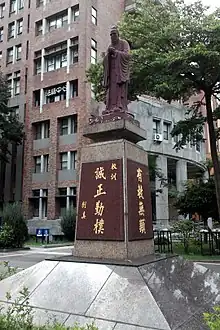
NTNU possesses several Taipei City-designated historic sites, including the Original Buildings of Taihoku High School, the residence of Liu Chen, the residence of Liang Shih-chiu, and more.
Culture
The NTNU emblem consists of a circle formed by six wooden bells, symbolizing collective progress and collaborative efforts to achieve "perfection" in education. The colors represent the blue sky and daylight, signifying the fairness and straightforwardness of the educators.[19]
The official school tree of NTNU is the Cassia fistula, chosen because its appearance resembles the traditional teaching whip from ancient times. [20]
Due to the similar pronunciation between the Chinese character "師" (normal) in the school's name and "獅" (lion), the mascot of the school is also a lion named "Da Shi Xiong". In addition to numerous lion-themed memorabilia, the campus features several lion-related sculptures. [21]
University structure [22]
Academic programs at NTNU are administered by 10 colleges: arts, education, international studies & social sciences, liberal arts, management, musicology, science, sports & recreation, technology & engineering and interdisciplinary industry academia innovation.
As of November 2022 the school published the following figures[11] for students enrolled and employees retained.
- Students enrolled: 15,112
- Undergraduate students: 8,394 (944 international students)
- Graduate students: 5,686 (682 international students)
- Overseas Chinese Students in Preparatory Programs: 1,032
- Faculty: 1,541
College of Education
NTNU's College of Education is the oldest and largest education college in Taiwan. The college collaborates with Tohoku University, Korea University, National Chengchi University, and Nanjing Normal University to offer the Asian Educational Leadership Program (AEL).This course is to nurture internationally minded educational professionals.[23]
- Department of Adult & Continuing Education
- Department of Child and Family Science
- Department of Civic Education and Leadership
- Department of Education
- Department of Educational Psychology and Counseling
- Department of Health Promotion and Health Education
- Department of Special Education
- Graduate Institute of Curriculum and Instruction
- Graduate Institute of Educational Policy and Administration
- Graduate Institute of Rehabilitation Counseling
- In-service Master program of Creativity Development
- Transdisciplinary Program in College of Education
School of Learning Informatics
- Program of Learning Sciences
- Graduate Institute of Information & Computer Education
- Graduate Institute of Library & Information Studies
College of Liberal Arts

- Department of Chinese
- Department of English
- Department of Geography
- Department of History
- Department of Taiwan Culture, Languages and Literature
- Graduate Institute of Taiwan History
- Graduate Institute of Translation and Interpretation
College of Science
- Department of Chemistry
- Department of Computer Science & Information Engineering
- Department of Earth Sciences
- Department of Mathematics
- Department of Physics
- Graduate Institute of Sustainability Management and Environmental Education
- Graduate Institute of Marine Environmental Science & Technology
- Graduate Institute of Science Education
School of Life Science
- Department of Life Science
- Undergraduate Program of Nutrition Science
- Graduate Program of Biotechnology and Pharmaceutical Industries
- Graduate Program of Nutrition Science
- Graduate Program of TIGP Biodiversity (Academia Sinica)
College of Arts
NTNU's College of Arts is the most ancient higher education institution for fine arts in Taiwan, and the birthplace of artistic development in Taiwan.
- Department of Design
- Department of Fine Arts
- Graduate Institute of Art History
College of Technology and Engineering
- Department of Electrical Engineering
- Department of Graphic Arts and Communications
- Department of Industrial Education
- Department of Mechatronic Engineering
- Department of Technology Application and Human Resource Development
- Graduate Institute of Electro-Optical Engineering
- International Doctoral Program in Integrative STEM Education
- Undergraduate Program of Electro-Optical Engineering
- Undergraduate Program of Vehicle and Energy Engineering
College of Sports and Recreation
- Department of Athletic Performance
- Department of Physical Education and Sport Sciences
- Graduate Institute of Sport, Leisure and Hospitality Management
College of International Studies and Social Sciences
- Department of Chinese as a Second Language
- Department of East Asian Studies
- Graduate Institute of European Cultures and Tourism
- Graduate Institute of International Human Resource Development
- Graduate Institute of Mass Communication
- Graduate Institute of Political Science
- Graduate Institute of Social Work
College of Music
NTNU's College of Music is the first higher education institution in Taiwan that specializes in cultivating professional talent in the field of music.
- Bachelor Degree Program of Performing Arts
- Department of Music
- Graduate Institute of Ethnomusicology
- Graduate Institute of Performing Arts
The National Symphony Orchestra was formed in 1986 through the merger of the experimental orchestras from NTNU, National Academy of Arts, and National Taiwan Academy of Arts.[24]
College of Management
NTNU is the first university in Asia with a teacher training background to receive AACSB accreditation.[25]
- Department of Business Administration
- Executive Master of Business Administration
- Executive Master of Business Administration in Global Fashion
- Graduate Institute of Global Business and Strategy
- Graduate Institute of Management
College of Interdisciplinary Industry Academia Innovation
- Graduate Institute of AI Interdisciplinary Applied Technology
- Graduate Institute of Green Energy and Sustainable Technology

Academy of Preparatory Programs for Overseas Chinese Students
Its predecessor was the National University of Preparatory School for Overseas Chinese Students, the only educational institution in Taiwan offering overseas Chinese students preparatory courses for university. In 2006, it was merged with NTNU.[26]
School of Teacher Education
The School of Teacher Education is the primary institution at NTNU responsible for the training of secondary teachers, and it is also responsible for coordinating and integrating relevant resources throughout the university. NTNU was authorized by the International Baccalaureate Organization as the first IB school for teacher's education in Taiwan.[27]
Mandarin Training Center
Mandarin Training Center (MTC) was founded in 1956 for teaching Chinese as a second language. It's the oldest and largest facility of its kind in terms of courses offered and students enrolled per year. Every year, approximately 3,000 students from around 70 countries come to study at MTC.[16]
French Center
French Center was founded by NTNU’s former president Mr. Kuo Wei-fan in 1984. The center aims to promote French language teaching, provide a conducive framework for the research of French language teaching in Taiwan, and facilitate cultural exchanges between China and France. The director of the Center manages only the administrative affairs. Teaching affairs, teacher recruitment, placement exams, and other tasks are always overseen by the French nationality of director of the courses.[28]
School of Continuing Education
In 1996, Extension Division of In-service Education and High School Teacher Research and Study Center were combined and reorganized into Extension Division for In-service and Continuing Education of NTNU. It was restructured again as the School of Continuing Education (SCE) in 2008. The aim is to provide in-service training for teachers and the general public.
Research institutes and centres
NTNU has a total of 6 university-level research centers, 21 college-level research centers, and 18 department-level research centers.[29] Such as The Chinese Language and Technology Center, Institute for Research Excellence in Learning Sciences (NTNU collaborates with Pennsylvania State University to establish),[30] Social Emotional Education Development Center, and International Taiwan Studies Center, have been granted funding through the Higher Education SPROUT project of the Ministry of Education.[31] The Research Center for Psychological and Educational Testing (RCPET) is responsible for organizing Taiwan's annual Comprehensive Assessment Program for Junior High School Students (CAP). NTNU is also the convening institution for the Committee of College Admission Practical Examination.[15] The Programme for International Student Assessment (PISA) in Taiwan is also overseen by this university.[32]
NTNU has established a joint laboratory with US-based Haskins Laboratories.[33] NTNU hosts the Asia Pacific Regional Center (APRC) for the Global Environmental Education Partnership (GEEP).[34]The Taiwan Studies Program between the UCLA and NTNU was established in 2017. Its aim is to create academic synergies and promote cutting-edge research in the field of Taiwan Studies.[35]
NTNU is the only university member state to join the “Infrared and Raman Users Group” (IRUG) in Taiwan.[36]
Affiliated school
The university also runs the Affiliated Senior High School of National Taiwan Normal University, a daughter institution for secondary-school students in Taiwan.
University alliances
NTNU is affiliated with National Taiwan University and National Taiwan University of Science and Technology as part of the National Taiwan University System (NTUS).[6]
NTNU is a member of University Academic Alliance in Taiwan (UAAT). The members include twelve universities such as National Taiwan University, National Cheng Kung University, National Tsing Hua University, National Yang Ming Chiao Tung University, National Sun Yat-sen University, National Chengchi University, and National Taiwan University of Science and Technology.[7]
NTNU is a founding member of University Alliance in Talent Education Development (UAiTED),[9] Taiwan-UK University Consortium,[37] International Consortium for Universities of Education in East Asia (ICUE),[8] Taiwan Education Alliance, Taiwan University Alliance for Sustainable Governance,[38] and Association of Asia-Pacific Business Schools (AAPBS).[10]
International Relations

NTNU nurtures a robust system of partnerships to enable this level of international study. Among the institutions that enjoy sister relationships with NTNU are the University of Pennsylvania, Columbia University, Johns Hopkins University, University of California, Los Angeles, University of California San Diego, University of California, Irvine, University of Illinois Urbana-Champaign, University of Texas at Austin, University of Wisconsin-Madison, Ohio State University, University of Maryland, College Park, and Rutgers University in the US, the University College London, King's College, University of London, University of Manchester, University of Glasgow and University of Birmingham in the UK, the University of British Columbia, University of Alberta and Simon Fraser University in Canada, the Australian National University, and Monash University in Australia, the École normale supérieure de Lyon, Sciences Po and Aix-Marseille University in France, University of Heidelberg, Free University of Berlin and University of Bonn in Germany, the Seoul National University, Korea University and Yonsei University in South Korea, Kyushu University, Osaka University, Hokkaido University, Nagoya University, Tohoku University, University of Tsukuba and Waseda University in Japan, Nanyang Technological University, Singapore Management University in Singapore,University of Hong Kong, Chinese University of Hong Kong, Hong Kong University of Science and Technology, Hong Kong Polytechnic University and City University of Hong Kong in HK, University of Auckland and University of Otago in New Zealand, University of Helsinki and University of Turku in Finland, Lund University and Uppsala University in Sweden, Leiden University and RSM Erasmus University in the Netherlands, Universidade de São Paulo in Brazil, University of Johannesburg in South Africa.[39] NTNU's connections in the Asia-Pacific region are particularly extensive, including dozens of academic institutions representing South Korea, Japan, Singapore, Thailand, Australia, and New Zealand.[40]
NTNU has established strategic pationships with Pennsylvania State University and Kuushu University.[41]The relationship between NTNU and Pennsylvania State University can be traced back to 1953, when NTNU received the support of USAID with the assistance of Pennsylvania State University.[42]
Mandarin Chinese Training
NTNU is best known for its Mandarin Training Center (formerly known as the Center for Chinese Language and Cultural Studies), a program founded in 1956 for the study of Mandarin Chinese to foreign students. The Mandarin Training Center represents one of the world's oldest and most distinguished programs for language study, attracting more than a thousand students from over sixty countries to Taiwan each year and making the Shida area of Taipei one of the city's most cosmopolitan.[11] Courses in language, literature, calligraphy, art and martial arts are offered in a series of three-month terms throughout the year, enabling international students to undertake language studies during summer breaks and within single semesters. The center also sponsors travel, hosts speech contests, and stages workshops and performances for a variety of East Asian arts. A Mandarin Training Center Alumni Association (MTCAA) has been operating since 1998.
The Test of Chinese as a Foreign Language (TOCFL) is administered by the Steering Committee for the Test Of Proficiency-Huayu (SC-TOP) at NTNU. [17] NTNU signed the Taiwan Huayu BEST Program partnership with Pennsylvania State University, University of California, Santa Barbara, University of California, Los Angeles, University of Maryland, Purdue University, University of Guam and SOAS University of London.[43]
International Cooperation and Programs
NTNU signed the Memorandum of Cooperation with the Reorienting Education towards Sustainability of UNESCO in 2018. In 2020, NTNU joined a new-launched network named the International Network of Teacher Education Institutions (INTEI) and a new ESD for 2030 Framework.
The International Chemistry Olympiad hosted by NTNU in 2005.
NTNU also participates in the Biodiversity Program of the Taiwan International Graduate Program of Academia Sinica. NTNU (National Taiwan Normal University) also collaborates with the Fulbright Program, providing opportunities for American students to pursue master's and doctoral studies in Taiwan. [44][45]
A new dormitory for NTNU international students is slated to open in 2024.[46]
Ranking and reputation
| University rankings | |
|---|---|
| Global – Overall | |
| QS World[47] | 431 (2024) |
| THE World[48] | 501–600 (2024) |
| USNWR Global[49] | 1049 (2022) |
| Regional – Overall | |
| QS Asia[50] | 70 (2023) |
| THE Asia[51] | 194 (2023) |

The predecessor of NTNU was the Taihoku High School under the Government-General of Taiwan (Taihoku High School). The school served as the sole pathway for Taiwanese students during the Japanese colonial era to enter universities for further studies. In the 1940s, this university was also one of the only four higher education institutions in Taiwan Province. As a result, admission competition was extremely intense.
NTNU has long been recognized as one of Taiwan’s elite institutions of higher education, especially in the field of humanities and social sciences.[52][53][54] NTNU is also the best university within Taiwan's normal university system. While Taiwan has other normal and education universities, this is the only university commonly referred to as "Shi Dà” (師大, normal university). Its affiliated high school is also known as “Shi Dà Fù Zhōng" (師大附中, HSNU).
Due to NTNU's excellent development in language education and internationalization, it has been chosen by the Ministry of Education as one of Taiwan's four landmark bilingual universities.[55]
Subject Rankings
- U.S. News & World Report Best Global Universities subject rankings:
Education and Educational Research: 9th (Asia's second)[56]
- Times Higher Education World University Rankings by subject:
Education: 15 (Asia's second)[57]
- QS World University Rankings by Subject:
Education & Training: 26[58]
Library & Information Management: 30[59]
Linguistics: 53[60]
Sports-Related Subjects: 51-100[61]
Performing Arts: 101-115[62]
Modern Languages: 101-150[63]
- Academic Ranking of World Universities (ARWU) of Academic Subjects:
Education: 39 (Asia's third)[64]
- Global Views Monthly Taiwan's Best University Rankings:
Universities focusing on humanities and social sciences: 1st[65]
Sustainable development
NTNU is the second institution in Asia to receive the Gold rating in the Sustainability Tracking, Assessment & Rating System (STARS), established by the Association for the Advancement of Sustainability in Higher Education (AASHE).[66] According to QS World University Rankings(Sustainability 2023), NTNU is ranked 3rd in Taiwan and around 50th globally in Sustainable Institutions and 100th in education influence.[67]
NTNU also serves as an important consulting and project implementation institution for the Environmental Protection Administration, the Forestry Bureau, and the Ministry of Education in promoting environmental education, sustainable development, and sustainable development goals.
List of NTNU People
Notable faculty[68]
- Apo Hsu (Hsu Ching-Hsin 許瀞心) – conductor
- Chen Daqi – a polymath, politician and pioneer of modern psychology in China
- Chen Houei-kuen – painter
- Cornelius C. (Neil) Kubler – American professor and scholar of Mandarin, Taiwanese and other dialects of Chinese; former U.S. diplomat (alumni)
- Kuo-En Chang – a computer education scholar, 13th president of NTNU
- Howard S.H. Shyr – a law scholar and politician
- Hu Qiuyuan – an author, educator and politician.
- Lee Shih-chiao – painter
- Lee Tze-Fan – painter
- Liang Shih-chiu – the first Chinese scholar to single-handedly translate the complete works of Shakespeare into Chinese
- Li Meishu – Zushi Temple designer
- Lin Yu-shan – painter
- Lo, Kii-Ming – musicologist
- Mou Zongsan – Chinese New Confucian philosopher
- Puru – artist, calligrapher, and member of the Qing dynasty ruling Aisin Gioro family and grandson of the Daoguang Emperor
- Shan-Hua Chien – musicologist
- Su Xuelin – Chinese author and writer
- Tyzen Hsiao – composer of the neo-Romantic school
- Wen-Pin Hope Lee – Taiwanese Golden Melody Award-winning composer
- Xie Bingying – a female soldier and writer born in Loudi, Hunan
- Yeh Shin-cheng – an environment scholar and politician
- Yu-xiu Chen – pianist and music scholar, the former chairman of Taiwan Broadcasting System, and former chairperson of Council for Cultural Affairs
- Yu Guangzhong – a writer, poet, educator, and critic
Notable alumni[68]
- Ang Ui-jin – Taiwanese linguist. He was the chief architect of the Taiwanese Language Phonetic Alphabet
- C.-T. James Huang – generative linguist, Professor and Director of Graduate Studies at Harvard, Fellow of the Linguistic Society of America, recipient of the Linguistic Society of Taiwan's Lifetime Achievement Award
- Shu-mei Shih – Taiwanese American scholar and literary theorist, Professor at University of California, Los Angeles
- Jackson T.-S. Sun – linguist, Fellow of Academia Sinica
- Li Jen-kuei – linguist, Fellow of Academia Sinica
- Gong Hwang-cherng – linguist, Fellow of Academia Sinica
- Lee Fong-mao – Emeritus Chair Professor at National Chengchi University, Fellow of Academia Sinica
- Wang Ming-ke – historian, Fellow of Academia Sinica
- Chang Yu-fa – Chinese historian, Fellow of Academia Sinica
- Wen-Hwa Lee – molecular biologist, Fellow of Academia Sinica, American Association for the Advancement of Science, the United States National Academy of Inventors, and The World Academy of Sciences. former president of China Medical University
- Ming-Chang Lin – chemist, Fellow of Academia Sinica
- Eva Y.-H.P. Lee – molecular biologist, Fellow of Academia Sinica
- Tien-tzou Tsong – physicist, Fellow of Academia Sinica
- Chang Chun-Yen – Taiwanese science education scholar
- Chih-Ta Chia – Taiwanese science scholar
- Aja Huang – Taiwanese computer scientist, member of the AlphaGo project
- Chuang Chi-fa – Taiwanese historian
- Den-Wu Chen – Taiwanese historian
- Chung Bum-Jin – former president of Sungkyunkwan University
- James C. P. Liang – former vice president of Leiden University
- Zhao, Jin-gi – former Education Ministry's Vice Minister, former president of National Sun Yet-sen University
- Yang Hung-duen – physicist, former president of National Sun Yet-sen University, former minister of the Science and Technology
- Zhang, Tian-Jin – former president of National Taipei University of Technology
- Cheng-Chih Wu – Taiwanese computer science education scholar, currently the president of NTNU
- Chen Chi-nan – anthropologist, former director of National Palace Museum, and former chairperson of Council for Cultural Affairs
- Huang Kuang-nan – Taiwanese educator and politician, former director of the National Museum of History, and the president of National Taiwan University of Arts
- Lin Jeng-yi – former director of National Palace Museum
- Lin Mun-lee – Taiwanese art scholar, former director of National Palace Museum
- Zhang Kehui – former Vice Chairman of the Chinese People's Political Consultative Conference
- Hsu Shui-teh – Taiwanese politician, former minister of the Ministry of the Interior
- Huang Kun-huei – Taiwanese politician, former minister of the Ministry of the Interior
- Chen Kuei-miao – Taiwanese politician
- Hua Chia-chih (Tjaravak Kadrangian) – Taiwanese politician, first chief of the Council of Indigenous Peoples
- Yaung Chih-liang – Taiwanese politician, former minister of the Department of Health
- Wang Jin-pyng – Taiwanese politician, former president of the Legislative Yuan
- Pan Wen-chung – Taiwanese educator, Minister of Education
- Wu Ching-ji – Taiwanese educator, former Minister of Education
- Kuo Wei-fan – Taiwanese educator, former Minister of Education, former president of NTNU
- Lin Ching-chiang – Taiwanese educator, former Minister of Education
- Chao-hsiang Yang – Taiwanese educator, former Minister of Education, former Minister of the Ministry of Examination
- Li, Jian-xing – Taiwanese educator, former Education Ministry's Vice Minister, the first president of National Taipei University
- Yang, Guo-ci – Taiwanese educator, former Education Ministry's Vice Minister, the first and second presidents of National Chiayi University
- Shih Chin-chi – former Education Ministry's Vice Minister
- Tieh-hsiung Wu – former Education Ministry's Vice Minister, former president of National University of Tainan
- Jeng-jie Huang – former president of National University of Tainan
- Zhang, Zhi-shan – the second president of National Changhua University of Education
- Wu Lien-shang – former president of National Kaohsiung Normal University
- Chen, Jing-tan – former president of National Taipei University of Education
- Wang Tuoh – Former Secretary-General of Democratic Progressive Party
- Huang Kun-huei – Chairman of Taiwan Solidarity Union
- Huang Min-hui – Vice Chairperson of Kuomintang, the Mayor of Chiayi City
- Chang Li-shan – the magistrate of Yunlin County
- April Yao – the magistrate of Taitung County
- Wong Chin-chu – Former Magistrate of Changhua County, former chairperson of Council for Cultural Affairs
- Lee Chu-feng – Kinmen's politician
- Yang Chih-liang – Taiwanese politician
- Peng Wan-ru – Taiwanese feminist
- Liu Guosong – the earliest and most important advocates and practitioners of modernist Chinese painting(Also received honorary degrees.)[69]
- Xi Murong – Taiwanese poet and painter
- Wai-lim Yip – Hong Kong and Taiwanese poet
- Chong Yee-Voon – Malaysian writer
- Ma Sen – Taiwanese writer
- Liu Yong – Taiwanese painter and essayist
- Chen Ya-lan – Taiwanese opera performer, TV program host, and the first actress in Taiwan's history to win The Golden Bell Award for Best Leading Actor in a Television Series playing a male role
- Li Hsing – Taiwanese film director
- Fan-Long Ko – Taiwanese composer
- Wilbur Lin, conductor of the Missouri Symphony
- Evan Yo – Taiwanese Mandopop singer
- Selina Jen – member of the Taiwanese girl group S.H.E
- Han Hsiang-ning – Chinese American artist
- Shara Lin – Taiwanese actress
- Uğur Rıfat Karlova – Turkish stand-up comedian
- Ku Chin-shui – Taiwanese aboriginal athlete
- Le Chien-Ying – Taiwanese archer
- Su I-Chieh – Taiwanese professional basketball player
- Tien Lei – Basketball player
- Hsieh Chang-heng – Baseball player in the CPBL
- Chen Hung-ling – Taiwanese badminton player
- Cheng Shao-chieh – Taiwanese badminton player
- Chi Shu-ju – Taekwondo practitioner and Olympic medalist
- Chien Yu-chin – Chinese Taipei badminton player
- Lorene Ren – Taiwanese actress
- Lu Yen-hsun – Taiwanese professional tennis player
- Yuan Shu-chi – Taiwanese archer
- Tseng Shu-o – Professional Soccer player in Australia
- Shen-keng Yang – first Lifetime Chair Professor in Taiwan
- Cai, Min-zhong – First chief of Dept. of Physical Education, Ministry of Education, first president of National Taiwan Sport University
- Nancy Chao – First chairperson of Sport Affairs Council, Executive Yuan
- Xu, Yi-xiong – former chairperson of Sport Affairs Council, Executive Yuan.
- Tai Hsia-ling – former chairperson of Sport Affairs Council, Executive Yuan. former president of University of Taipei
- Shao-Hsi Chang – former chairperson of Sports Administration, Ministry of Education
- Hsu, Kuang-piao – President of National Taiwan University of Sport
- Tung-Tai Lin – a professor at the Graduate Institute of Mass Communication at NTNU
- Man-houng Lin – Taiwanese historian, the first woman president of the Academia Historica
- Tan See Seng – Malaysian educators
- Li, Jin-zhen – first president of National Quemoy University
- Cai, Dian-mo – former president of National Taitung University
- Mao, Lian-wen – former president of University of Taipei
- Choong, Kam-kow – former president of LASALLE College of the Arts and Malaysian Institute of Art
- Rong-xing Zheng – first president of National Taiwan College of Performing Arts
Mandarin Training Center alumni
- Richard Bernstein – American journalist
- March Fong Eu – American politician
- Andrew Fastow – former CFO of Enron
- Howard Goldblatt – American literary translator
- Imre Hamar – Hungarian scholar of Chinese studies
- Ryutaro Hashimoto – former Prime Minister of Japan
- Jon Huntsman Jr. – former United States Ambassador to Singapore from 1992 to 1993, and China from 2009 to 2011; current U.S. Ambassador to Russia
- Koichi Kato – former government minister of Japan
- Pierre Ryckmans – Belgian-Australian writer, essayist and sinologist
- Kevin Rudd – former Prime Minister of Australia
- Chie Tanaka – Japanese model and actress
- Richard Vuylsteke – President of the American Chamber of Commerce in Hong Kong
- Stephen H. West – American sinologist
- Albert E. Dien – Emeritus professor at Stanford University
- Tsai Ming-liang – Malaysian filmmaker based in Taiwan
Honorary degree
- Jack Ma Yun – the co-founder of Alibaba Group [70]
- Gao Xingjian – the Nobel Prize in Literature laureate of 2002 [71]
- Liao Shiou Ping – Father of Modern PrintMaking in Taiwan [72]
- Liu Chen – Taiwanese educator, the former president of NTNU
Nomenclature
The standard abbreviated reference to National Taiwan Normal University in English is the acronym NTNU. The standard abbreviated form in Mandarin Chinese is the portmanteau Shi1da4. Romanized as "Shida", this form appears transliterated in place names associated with the campus: Shida Road, Shida Night Market, Shida Bookstore, and the like.
The word normal in the school's name perpetuates an English usage of the term that, if archaic in some countries, remains common in Asia. A "normal school" trains future teachers in educational norms.
MTC is the standard acronym for the Mandarin Training Center.
See also
References
- ↑ 校訓 [School Motto] (in Chinese). NTNU. Archived from the original on 2014-11-10. Retrieved 2014-06-24.
- ↑ "Classroom Buildings(Cheng)". NTNU. Archived from the original on 2005-02-04. Retrieved 2014-07-15.
- ↑ "NTNU-About Us".
- ↑ "::: Association of Asia-Pacific Business Schools". Archived from the original on 2020-12-13. Retrieved 2018-11-02.
- ↑ The name of the university is translated using Chinese word order. By English grammar rules, it is National Normal University of Taiwan.
- 1 2 國立臺灣大學系統. triangle.ntu.edu.tw (in Chinese (Taiwan)). Archived from the original on 2021-04-29. Retrieved 2018-08-10.
- 1 2 "The Texas A&M University System and the University Academic Alliance in Taiwan Sign Collaborative Agreement – TAMUS System News". news.tamus.edu. Retrieved 2023-11-30.
- 1 2 "Implementation Organization : International Consortium for Universities of Education in East Asia". www2.u-gakugei.ac.jp. Archived from the original on 2022-12-27. Retrieved 2022-12-27.
- 1 2 "Our Members". uaited.ust.edu.tw. 2021-09-24. Archived from the original on 2020-11-25. Retrieved 2022-12-27.
- 1 2 "::: Association of Asia-Pacific Business Schools". www.aapbs.org (in Korean). Archived from the original on 2020-12-13. Retrieved 2018-11-20.
- 1 2 3 4 5 "NTNU-About Us". en.ntnu.edu.tw. Archived from the original on 2022-11-25. Retrieved 2022-11-25.
- ↑ "National Taiwan Normal University Ranking".
- ↑ "National Taiwan Normal University". Top Universities. Retrieved 2023-08-11.
- ↑ "國立台灣師範大學 心理與教育測驗研究發展中心". www.rcpet.edu.tw. Retrieved 2023-10-13.
- 1 2 "組織架構 | 大學術科委員會聯合會" (in Chinese (Taiwan)). 2018-07-09. Retrieved 2023-10-13.
- 1 2 "Taiwan Today". taiwantoday.tw. Retrieved 2023-11-14.
- 1 2 GW-Design(http://www.gw-design.com). "國家華語測驗推動工作委員會". 國家華語測驗推動工作委員會-華測會 (in Chinese (Taiwan)). Retrieved 2023-12-06.
- ↑ Public historical marker at NTNU Lecture Hall, Viewed 2007-08-04
- ↑ TNU University Archives (2023-12-06). "NTNU's emblem".
- ↑ NTNU University Archives (2023-12-06). "School tree".
- ↑ "網紅KOL校友串聯祝福百年校慶 社群媒體發文分享校園回憶". alumni.ntnu.edu.tw (in Traditional Chinese). Retrieved 2023-12-06.
- ↑ "NTNU-Academics". en.ntnu.edu.tw. Retrieved 2023-10-12.
- ↑ "About | AELCourse". www.sed.tohoku.ac.jp. Retrieved 2023-12-06.
- ↑ "師大百寶箱》E009 校園活動 - 國家交響樂團". 國立臺灣師範大學. Retrieved 2023-11-09.
- ↑ "NTNU- National Taiwan Normal University". en.ntnu.edu.tw. Retrieved 2023-10-13.
- ↑ "NTNU Academy of Preparatory Programs for Overseas Chinese Students Academy of Preparatory Programs for Overseas Chinese Students". www.nups.ntnu.edu.tw. Retrieved 2023-11-10.
- ↑ "NTNU IBEC - English". sites.google.com. Retrieved 2023-10-13.
- ↑ "NTNU-French Center". en.ntnu.edu.tw. Retrieved 2023-11-14.
- ↑ "本校各級中心 - 國立臺灣師範大學 研究發展處". www.acad.ntnu.edu.tw. Retrieved 2023-11-09.
- ↑ "學習科學跨國頂尖研究中心". www.irels.ntnu.edu.tw. Retrieved 2023-12-11.
- ↑ "國立臺灣師範大學 秘書室公共事務中心". pr.ntnu.edu.tw. Retrieved 2023-11-09.
- ↑ "臺灣PISA國家研究中心及國際學生能力評量計畫". pisa.irels.ntnu.edu.tw. Retrieved 2023-12-06.
- ↑ "NTNU- National Taiwan Normal University". en.ntnu.edu.tw. Retrieved 2023-10-13.
- ↑ "SDG 17 – 國立臺灣師範大學永續發展中心 NTNU SD Center" (in Chinese (Taiwan)). Retrieved 2023-11-09.
- ↑ "UCLA-NTNU Initiative". www.international.ucla.edu. Retrieved 2023-12-11.
- ↑ "SDG 11 – 國立臺灣師範大學永續發展中心 NTNU SD Center". Retrieved 2023-10-13.
- ↑ British Council in Taiwan (2023-11-22). "The British Council and the Ministry of Education in Taiwan establish the first ever Taiwan-UK University Consortium".
- ↑ "Nine Universities Jointly Established Taiwan University Alliance for Sustainable Governance - spotlight". National Taiwan University. Retrieved 2023-11-30.
- ↑ school website, NTNU (December 29, 2022). "Partner Institutions". NTNU school website. Archived from the original on December 8, 2022. Retrieved December 29, 2022.
- ↑ List of Partner Institutions Archived 2016-03-04 at the Wayback Machine Accessed 2015-09-03
- ↑ "National Taiwan Normal University - Office of International Affairs". bds.oia.ntnu.edu.tw. Retrieved 2023-10-12.
- ↑ "NTNU- National Taiwan Normal University". en.ntnu.edu.tw. Retrieved 2023-12-11.
- ↑ NTNU Overseas Mandarin Training Center (December 29, 2022). "About us". Taiwan Huayu BEST Program X NTNU Overseas Mandarin Training Center. Archived from the original on December 29, 2022. Retrieved December 29, 2022.
- ↑ "Partners – Fulbright Taiwan, Foundation for Scholarly Exchange". Retrieved 2023-12-11.
- ↑ "國立臺灣師範大學國際人力資源發展碩士學位 NTNU Master's Degree Program Award in International Human Resource Development – Fulbright Taiwan, Foundation for Scholarly Exchange" (in Traditional Chinese). Retrieved 2023-12-11.
- ↑ https://focustaiwan.tw/culture/202001140012 Archived 2022-02-07 at the Wayback Machine 'NTNU to build new dorm for international students', Focus Taiwan, 2020.01.14
- ↑ "2021 QS World University Rankings". Archived from the original on 2020-06-09. Retrieved 2020-11-27.
- ↑
- ↑
- ↑ "2021 QS Asian University Rankings". Archived from the original on 2018-10-24. Retrieved 2020-11-27.
- ↑ "Times Higher Education Asia University Rankings 2020". Archived from the original on 2020-06-04. Retrieved 2020-11-27.
- ↑ "NTNU- National Taiwan Normal University". en.ntnu.edu.tw. Retrieved 2023-10-13.
- ↑ "NTNU-About Us". en.ntnu.edu.tw. Retrieved 2023-10-13.
- ↑ News, Taiwan (2023-07-02). "Global Views Monthly ranks Taiwan's top universities | Taiwan News | 2023-07-02 12:09:00". Taiwan News. Retrieved 2023-12-07.
{{cite web}}:|last=has generic name (help) - ↑ "NTNU- National Taiwan Normal University". en.ntnu.edu.tw. Archived from the original on 2022-12-29. Retrieved 2022-12-29.
- ↑ "Best Global Universities for Education and Educational Research". U.S. News & World Report. November 29, 2022. Archived from the original on November 28, 2022. Retrieved November 29, 2022.
- ↑ "World University Rankings 2019 by subject: education". Times Higher Education World University Rankings. November 29, 2022. Archived from the original on November 28, 2022. Retrieved November 29, 2022.
- ↑ "QS World University Rankings by Subject 2022: Education & Training 2022". QS World University Rankings. November 29, 2022. Archived from the original on March 9, 2023. Retrieved November 29, 2022.
- ↑ "QS World University Rankings by Subject 2019: Library & Information Management". QS World University Rankings. November 29, 2022. Archived from the original on November 28, 2022. Retrieved November 29, 2022.
- ↑ "QS World University Rankings by Subject 2021: Linguistics". QS World University Rankings. November 29, 2022. Archived from the original on December 10, 2020. Retrieved November 29, 2022.
- ↑ "QS World University Rankings by Subject 2022: Sports-Related Subjects". QS World University Rankings. November 29, 2022. Archived from the original on November 28, 2022. Retrieved November 29, 2022.
- ↑ "QS World University Rankings for Performing Arts 2022". Top Universities. Archived from the original on 2022-06-08. Retrieved 2022-12-29.
- ↑ "QS World University Rankings for Modern Languages 2022". Top Universities. Archived from the original on 2022-12-29. Retrieved 2022-12-29.
- ↑ "2022 Global Ranking of Academic Subjects". Academic Ranking of World Universities (ARWU). November 29, 2022. Archived from the original on November 28, 2022. Retrieved November 29, 2022.
- ↑ "NTNU- National Taiwan Normal University". en.ntnu.edu.tw. Archived from the original on 2022-12-29. Retrieved 2022-12-29.
- ↑ "National Taiwan Normal University | Scorecard | Institutions | STARS Reports". Retrieved 2023-10-12.
- ↑ "NTNU- National Taiwan Normal University". en.ntnu.edu.tw. Retrieved 2023-11-09.
- 1 2 "NTNU-Resources&Offices". en.ntnu.edu.tw. Archived from the original on 2018-08-10. Retrieved 2018-08-10.
- ↑ "畢典》劉國松獲頒臺師大名譽博士 勉畢業生在五彩繽紛世界起步奔跑". 國立臺灣師範大學. Retrieved 2023-10-13.
- ↑ "Alibaba founder to receive honorary doctorate in Taiwan - Focus Taiwan". Focus Taiwan - CNA English News. 2015-06-04. Retrieved 2023-10-13.
- ↑ "NTNU- National Taiwan Normal University". en.ntnu.edu.tw. Retrieved 2023-10-13.
- ↑ "NTNU- National Taiwan Normal University". en.ntnu.edu.tw. Retrieved 2023-10-13.
External links
- National Taiwan Normal University official website (in Chinese and English)